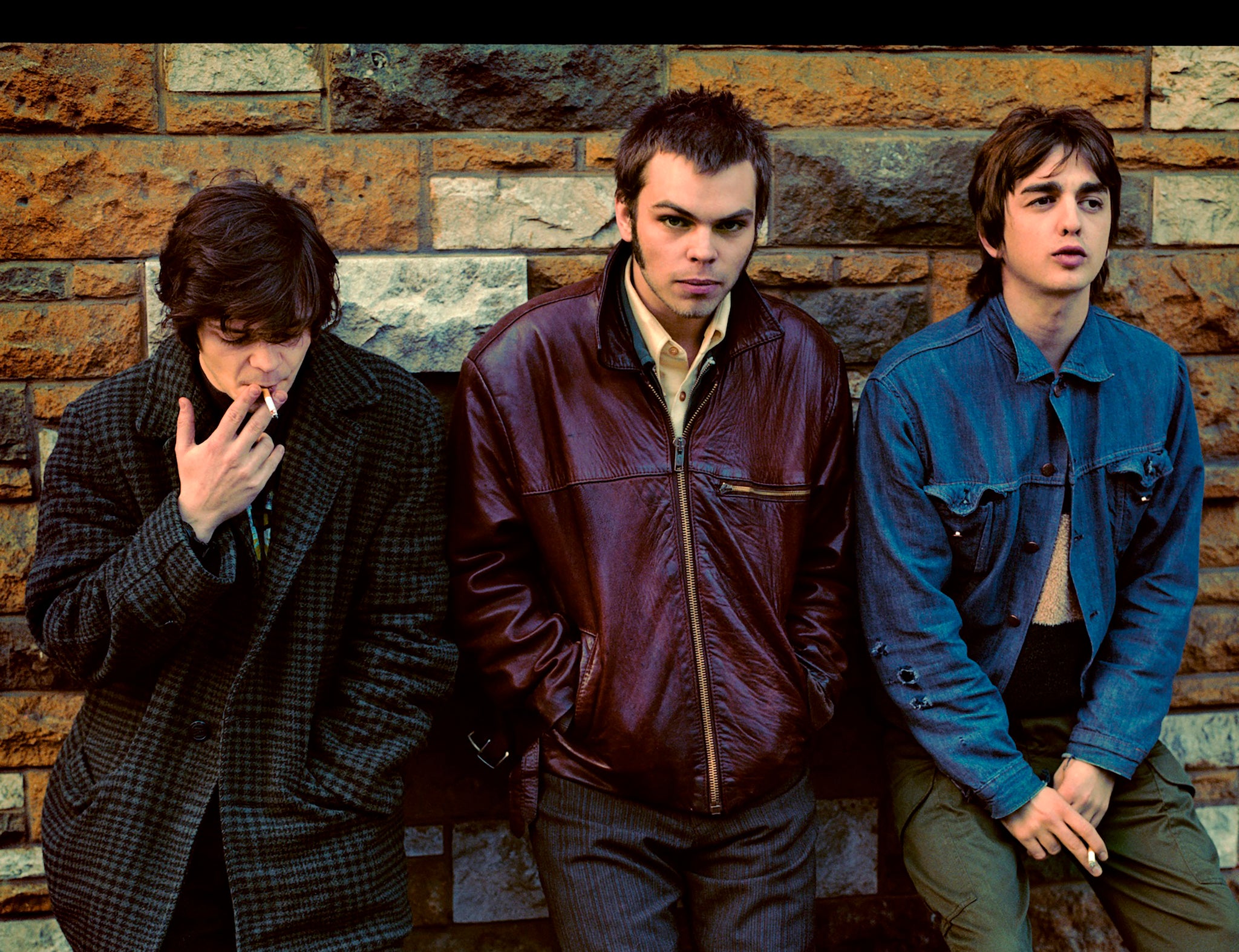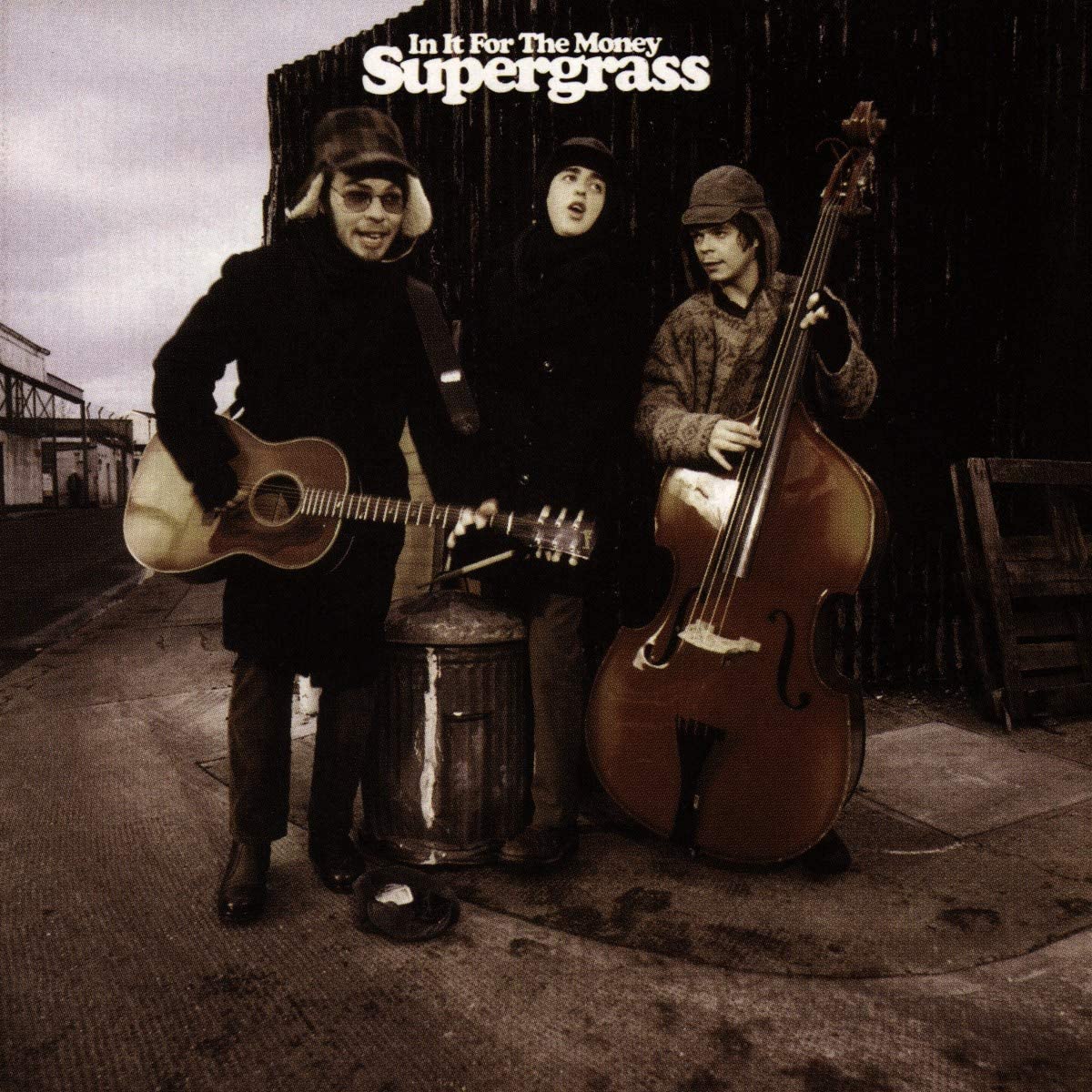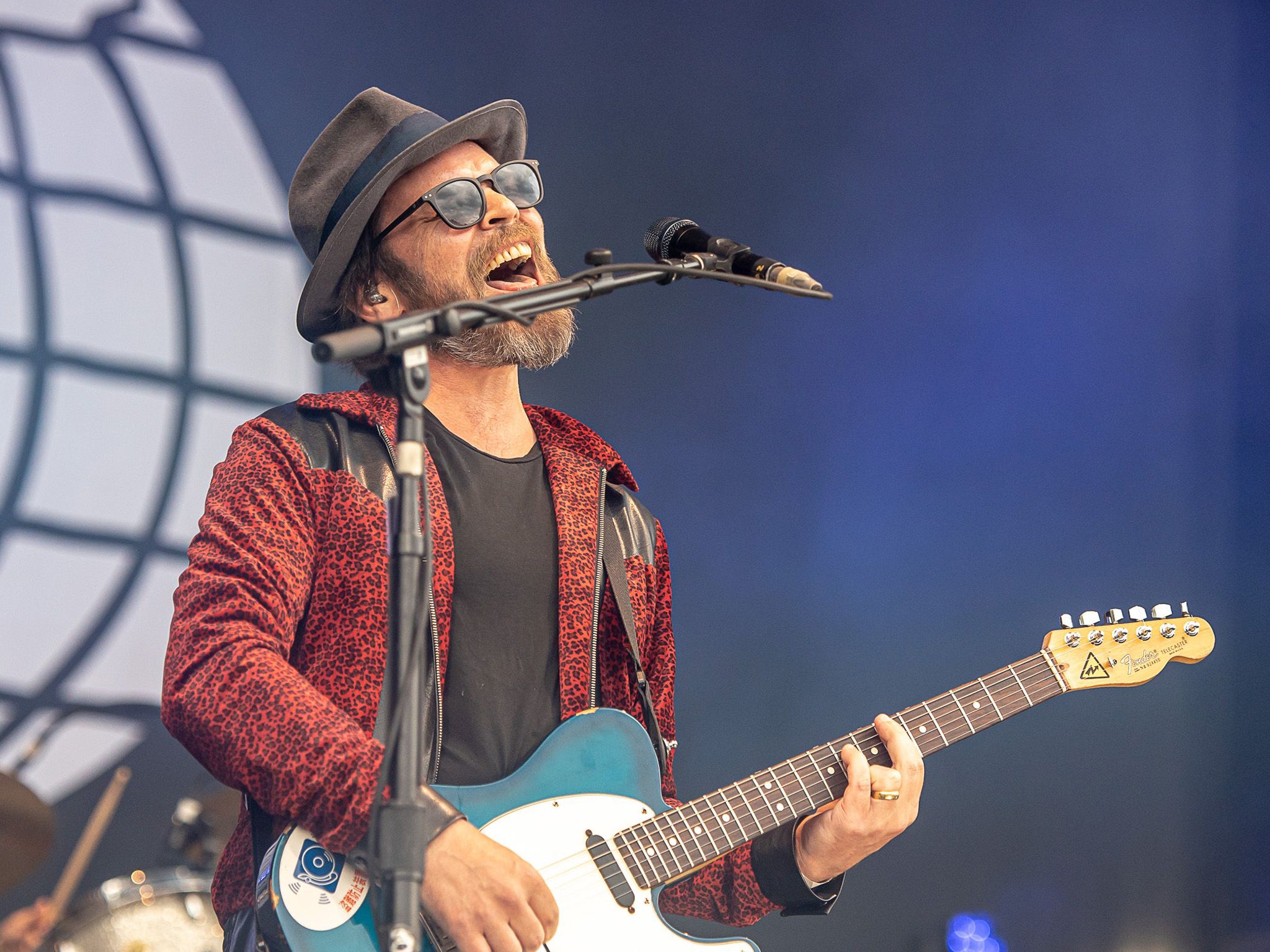Supergrass: ‘We never fell out massively – it just sort of fizzled a bit’
The ‘Alright’ stars have recently reunited and, though there’s no plans for new music as yet, their friendship is as strong and lively as ever. They talk to Shaun Curran about getting the band back together, boozing and turning down Steven Spielberg

The members of Supergrass are discussing their most popular and enduring song, the era-defining 1995 anthem “Alright”. “It’s got the spirit of the band at that moment in time,” says drummer Danny Goffey. “But it is sort of a bit cheesy.”
“It wasn’t like we were leaping around trying to write some big pop song,” says frontman Gaz Coombes. “It wasn’t a wacky thing. We were just in the pub going ‘keep our teeth nice and clean’, that’s great!”
Surely it was more the teenage hi-jinks of the video – the sideburns, the choppers, the wild energy – that cemented Supergrass’ reputation as boyish scallywags? “Yeah exactly,” says bassist Mick Quinn.
“I do look back at the video and cringe,” says Goffey.
“We should have got kids to do the whole thing,” adds Coombes.
“But we had such watchable faces back then,” Goffey says. “Everyone loved us. They thought we were such big characters.” He checks himself. “We sound like we’re in a fucking retirement home!”
It’s been two years since Supergrass actually did come out of a retirement of sorts. Having split in mild hostility with the collective tank empty in 2010, their reformation was met with a huge wave of goodwill by those who fondly remembered the group’s effervescent heyday. Their melodic, frenzied post-punk ditties, full of youthful wit, charm and mischief, made them a whirlwind sensation: 1995’s I Should Coco became the fastest selling debut album on Parlophone since The Beatles’ Please Please Me, shifting one million copies. Supergrass went on to have five top 10 albums and racked up 10 top 20 hits, which included a run of Nineties releases – “Caught by the Fuzz”, “Mansize Rooster”, “Going Out”, “Richard III”, “Sun Hits the Sky”, “Pumping on Your Stereo”, “Moving” – that elevated them into the pantheon of great British singles bands. Even when interest waned, their pop knack never fully deserted them, and their festival appearances were guaranteed good times.
Still, something of a cliché persists that Supergrass were underrated. “I think we did really well!” counters Coombes. “We got a lot of love.”
“I think it’s maybe compared to Oasis and Blur, who were massive,” Goffey adds. “But I can live with that. It’s better than being overrated.”
Supergrass’ reformation was only meant to last throughout 2020, but Covid-19 had other ideas. “It’s the longest reunion in history,” laughs Coombes. Having dipped their toe back in the water with two shows in September 2019 – an unannounced appearance at Glastonbury’s Pilton Party followed by a club show at London’s intimate Oslo venue – they managed to squeeze their scheduled UK tour in just before last year’s first lockdown. It culminated in two nights at the cavernous Alexandra Palace, which they all say were among the best gigs they’d ever played.
“I was a bit nervous,” Goffey says of getting the band back together. “I’d hardly played the drums for years. I worried I was going to play off half the speed or something in my arms wouldn’t work properly, or I’ve just been boozing too much for 10 years.”
Enjoy unlimited access to 100 million ad-free songs and podcasts with Amazon Music
Sign up now for a 30-day free trial. Terms apply.
ADVERTISEMENT. If you sign up to this service we will earn commission. This revenue helps to fund journalism across The Independent.
Enjoy unlimited access to 100 million ad-free songs and podcasts with Amazon Music
Sign up now for a 30-day free trial. Terms apply.
ADVERTISEMENT. If you sign up to this service we will earn commission. This revenue helps to fund journalism across The Independent.
As it happened, they soon nestled into the old routine. “We got into that familiar feeling with rehearsals very quickly,” Coombes smiles. “We’d rehearse for an hour and then someone gets bored. And then you go for a pint. It’s been 20 years, and we’ve not really grown up properly.”
“You remember the little things,” Goffey says. “I learned not to get too f***ed up on the first gig when you’ve got three nights in a row.”
“It took you 25 years to learn that?” Coombes asks.
“I’m re-learning!”
“That’s one for grandchildren,” Quinn says. “Over the fire when you talk to your granddaughter – ‘remember, don’t get don’t get too f***ed up on the first night’.”
When Coombes talks of the “inherent chemistry that made us get in a room together in 1992”, just as his and Goffey’s first band The Jennifers ended, I get a keen sense of what he means. With the greying skies becoming more ominous, we are cramped onto a large wooden table in the empty backstage area of South Facing Festival in Crystal Palace, the distant echo of tonight’s support act The Cribs sound-checking in the distance. Gaz’s brother, keyboardist Rob Coombes, who became a permanent member in 2002, also joins, and makes the point that the reunion has not just “been about reconnecting the musical vibe, but also as mates”.
It seemingly worked. Today they show that particular camaraderie you only really have with people you’ve known since your teens: the knockabout back and forth, the daft jokes, the shared history. Coombes and Quinn, good for a quip, are nonetheless more serious than Goffey, who, still wiry and youthful, plays court jester and gives the impression he’d still be lively on a night out (Goffey was once a tabloid fixture thanks to his marriage to fashion designer Pearl Lowe and their association with the “Primrose Hill set”). They talk about their early days in Oxford – Coombes and Goffey were at school together; Coombes and Quinn met washing dishes at the local Harvester – with both a sweetness and silliness that is endearing.

It’s what made the band’s demise in 2010 all the more unsatisfying. With diminishing returns commercially, the joy had been sucked out of Supergrass like the air being slowly released from a balloon. “It just sort of fizzled a bit, really,” Goffey says. “It was more musically strained at that point. We never really fell out massively.”
Coombes recalls a record label playback of unfinished seventh album Release the Drones as the final nail in the coffin. “It was horrific. It just didn’t sound very good. I could see in their faces that they just didn’t really like it. It was like disappointing your parents. But you have to be philosophical. It didn’t work, for whatever reasons. You can’t fight it.”
Coombes soon called time on the group via email, leaving the members of Supergrass without the job they’d had their entire adult life. What were they thinking?
“Am I going to go back to washing dishes now?” Quinn says.
“You just get on with it, don’t you?” adds Goffey. Get on with it they did: Quinn joined veteran Oxford shoegazers Swervedriver; Goffey played with Babyshambles and started a new band, Vangoffey; Rob became a teacher, while Coombes began a solo career that was validated when his excellent 2015 album Matador was nominated for the Mercury Prize.
Yet unfinished business lingered. Goffey was the reunion’s catalyst, convincing the others that the 25-year anniversary of I Should Coco deserved a victory lap. It was certainly an era worth celebrating: Supergrass went from playing pubs in Oxford to the top of the charts to supporting The Cure in Rio to 80,000 people at warp speed. “You don’t have time to take any of it in,” says Coombes. “You just sort of ride it out. I remember the first American tour was a real eye-opening awakening for me personally.”

“You went from boy to man,” Goffey says.
“It was probably somewhere in between,” Coombes adds.
Supergrass’s arrival coincided with the zenith of Britpop, for which they will forever be associated. “When we started, we were actually called [the] new wave of new wave,” Goffey says.
“We’ve never aggressively denied it, being a Britpop band,” Coombes says. “We just didn’t align with anything. We never really did all those TV programmes.”
“Well, we did do that one which Damon Albarn presented,” adds Goffey.
“Britpop Now?” Quinn asks.
“Yeah. So that’s probably why people think we’re Britpop,” Goffey deadpans. “You’ve got no control over what the press calls you. I don’t think any band ever said, ‘We sound like Brit…pop?’ It was more like a party-political slogan that just sort of stuck.”
By 1997, with the champagne going flat on the Britpop party, Supergrass released their stellar second album In It for the Money, now receiving the bells and whistles reissue treatment. If anything, it was even better than I Should Coco: darker, heavier, more expansive, more far out, with psychedelic flourishes and complex arrangements. “We were playing some big festival stages and those punk songs don’t work as well, so we wanted something bigger,” says Quinn.
“But not in that Kings of Leon way,” Coombes adds, with a little contempt. “We weren’t going ‘stadium’.”
“We just wanted to try and shake off a bit of the ‘Alright’ thing, do something different,” Quinn adds.
Was it a deliberate attempt to shed the cheeky scamp image? “We’ve always got the cheeky scamp stuff,” Coombes says.
It actually gave me confidence ... We’d turned down Spielberg, baby!
“I quite like the cheeky scamp stuff,” says Goffey.
“It was more about what you soak up,” Coombes adds. “We’d been through a lot, and we wanted to experiment a bit more.”
The album’s title was a tongue-in-cheek, sly dig at what they saw as other bands selling out. “We were trying to top I Should Coco,” Quinn says, “which was a cheeky snide at people putting on Cockney accents. Which we did.”
“We saw how people adapted themselves or their band to make money, but we were never like that,” Goffey says. “If we’d have made ‘Alright 2’,” Quinn says, “then we would have been in it for the money.”
They proved as good as their word. During the making of In It for the Money, the band received a mind-spinning offer from Steven Spielberg, no less, to star in a Monkees-style comedy-variety TV show. It was a serious proposal: the band flew over to meet the Jaws director in Hollywood. “I remember thinking it was a bit of a distraction,” says Coombes, “but we decided it was a chance to do this mad, insane thing, and possibly have a new career. In the end it actually gave me confidence, as it made me feel… big. We’d turned down Stevie baby!”
“But then again, it might have gone the other way as well,” Goffey says. “He might have walked away saying [adopts dodgy American accent] ‘guys, they’re not actors, I’ll tell you that, Gaz doesn’t have the right face for it’. We think we’ve turned him down when he was just really polite about it.”
Do you ever wonder about the sliding doors moment? “Yeah, sometimes,” says Coombes. “I’d have probably been dead in a hotel room within a year.” He pauses. “That was quite dark that, wasn’t it?”

The rain holds off, and later Supergrass will play a brilliant career-spanning set full of vim and vigour, complete with a suite of songs from In It for the Money, performed with horns for the first time since 1997. Watching them smile their way through the evening, it’s hard to imagine they will go their separate ways again. Yet they insist, as they have done from the outset of the reunion, that new music is not on the agenda. When I ask, Coombes is vehement with his “nah”. It seems that he is the member who is most unconvinced, perhaps not surprising given the success of his solo career.
“We talk about it when we get really pissed sometimes,” Goffey says.
“But the challenge for recording a new record would probably not allow for where everyone is musically now,” Quinn says. “And so with that out of the equation, it’s [the live reunion] been slightly easier.”
“We were quite focused on what we wanted to do in this period of time,” says Coombes. “We just wanted to arrange some gigs that really excite us, that we could mark off as special. We think we’ve done that.”
Even with an open-ended future, it’s genuinely heartening to see them enjoying themselves, and each other, again: after all, what is Supergrass if it’s not a load of fun? “F***ing rubbish!” Goffey shouts, to much laughter around the table.
The remastered and expanded ‘In It for the Money’ is out now via BMG
Join our commenting forum
Join thought-provoking conversations, follow other Independent readers and see their replies
Comments


Bookmark popover
Removed from bookmarks